diabetes support

free shipping over $100 (USA & Canada)
1-877-937-4372 the pet expert hotline
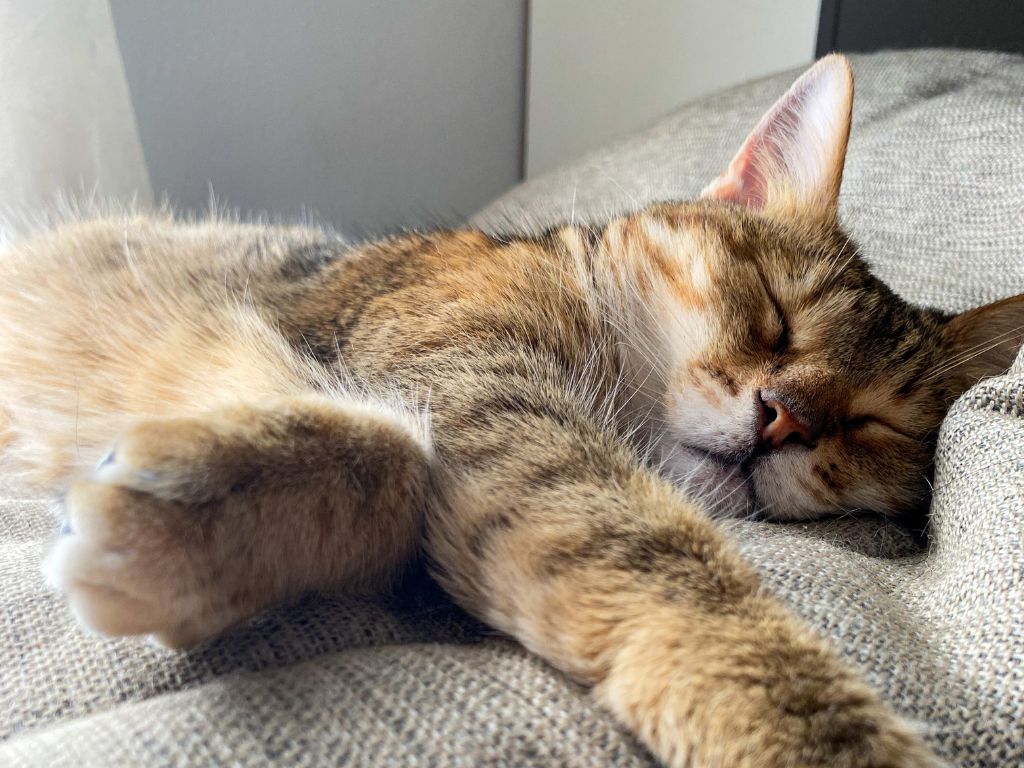
Cat pancreas inflammation, or pancreatitis, is a common health condition in feline kiddos. Chronic pancreatitis is the most recurrent type in cats, which results in irreversible histopathologic changes. Acute feline pancreatitis, on the other hand, is generally characterized by reversible inflammation after removing the cause.
The pancreas produces enzymes essential for the digestion of proteins, carbohydrates, and fats. When working correctly, these enzymes become active only when they reach the small intestine. In a cat with pancreatitis, they activate as soon as they’re released and begin to digest the pancreas itself, causing inflammation.
Interestingly, compared to people, where abdominal pain is considered a hallmark finding of the disease, cats with pancreatitis rarely present that symptom. Instead, cat pancreas inflammations usually cause nonspecific signs like:
The presence of one or more of these symptoms will help the veterinarian to categorize the severity of the disease. So it’s essential to keep your eyes out for any behavioral changes in your kitty.
Most cases of cat pancreatitis are idiopathic, meaning it either arises spontaneously or the root cause is unknown. However, these risk factors have been identified in the veterinarian community:
Accurate diagnosis of pancreatitis in cats requires the integration of the animal’s medical history and clinical findings. Depending on the cat’s symptoms, the following tests may be needed to rule out differential diagnoses:
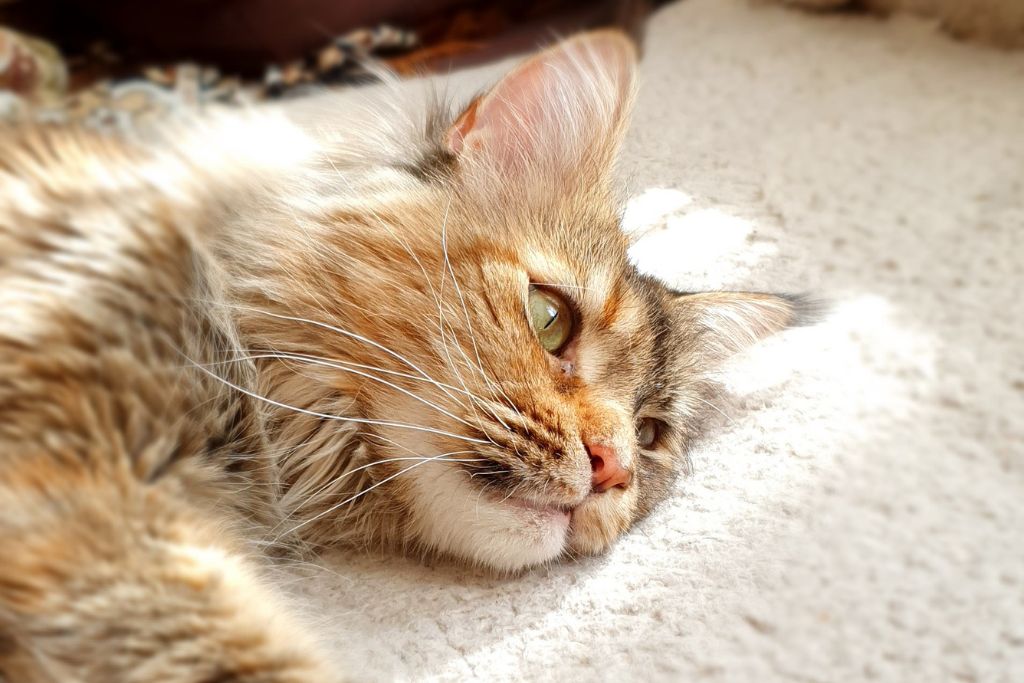
For acute pancreatitis, treating potential causes is imperative. Fluid therapy, analgesics, antiemetics, nutritional support, and other symptomatic and supportive care are great examples.
On the other hand, managing chronic pancreatitis involves treating potential causes, diagnosis, and concurrent conditions. Analgesics, antiemetics, anti-inflammatory and immunosuppressive treatments are commonly used in these cases.
It is often recommended that cats with pancreatitis stick to a diet with low to moderate amounts of fat and moderate levels of proteins and carbohydrates. Feel free to read more details on how to help manage pancreatitis with the right food here. Natural herbal supplements can be used alongside a balanced diet and vet-prescribed medication.
Unfortunately, once a cat has pancreatitis, they have a higher chance of having other conditions, like diabetes. NHV Mellit is an herbal formulation that is designed to help reduce inflammation of the pancreas. This same supplement can help protect other organs from the severe imbalances that are triggered throughout the body due to diabetes. Lastly, Mellit also has properties that may help control blood sugar levels.
Cat pancreatitis is also often accompanied by inflammatory bowel disease (IBD), cholangitis, or both. Thus, NHV TumFlora may be helpful. Tumflora is a blend of herbs that helps ease symptoms of IBD in cats, including reducing acid buildup. Some of the herbs present in this formulation, such as Fennel, have properties that are beneficial for digestive problems, relaxing spasms, relieving cramps, and helping to restore appetite.
In addition, pancreatitis may trigger hepatic lipidosis. In this way, NHV Milk Thistle would also be helpful. Many studies have shown the effects of Milk Thistle on the pancreas, suggesting that silibinin, an antioxidant derived from the plant, may be therapeutically beneficial for treating different pancreatic issues.
Lastly, NHV Turmeric contains curcumin, a powerful antioxidant that can help reduce inflammation and relieve the uncomfortable symptoms of pancreatitis.
diabetes support

Supports healing of pancreatitis and diabetes mellitus in cats
buy 2 and save $3
3 month supply for a small to medium size pet
A holistic supplement formulated with 9 powerful herbs.


A holistic supplement formulated with 9 powerful herbs.

Diabetes in cats is a common pancreatic disorder that occurs when sugar builds up in the bloodstream instead of entering the tissue to provide energy. If left untreated, your cat can be prone to infections, a slower healing process, and even blindness. Diabetes can also lead to heart, liver or kidney disease.
Some cat breeds are more prone to diabetes, such as the Russian Blue. You can find out if your cat breed is more prone to contract diabetes at NHV breeds and conditions online.
If you have questions about any of our holistic supplements, you can ask an expert at NHV because we want to help your kitty live a longer healthier life naturally.
Read a real pet story of how NHV’s proprietary blend of holistic support helped a cat with diabetes mellitus.
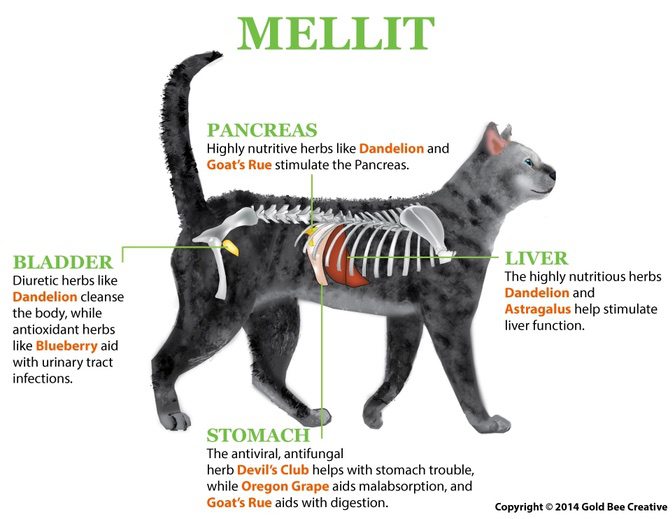
NHV’s Mellit for Cats is an herbal formula explicitly made to support pancreatitis and diabetes mellitus in cats. This potent blend contains nine powerful ingredients designed to help control blood sugar levels and provide cat circulatory support, as well as strengthen and protect other organs that may be affected due to the imbalances triggered in the body.
Select your pet's weight to determine the correct dose.
To be taken twice daily. Determine your pet’s weight and then use the easy chart below to determine the correct dose. This is the minimum dosage.
Pet's Weight Dosage
0 - 15 lb = 0.5 ml
16 - 30 lb = 1.0 ml
31 - 45 lb = 1.5 ml
46 - 60 lb = 2.0 ml
61 - 75 lb = 2.5 ml
Over 75 lb = 3.0 ml
How to Administer
Shake well before use. The easiest method is to use the dropper provide and places the drops into your pet’s food or favorite treat. You can also use the dropper and squirt directly into the pet’s mouth.
Some pets can be finicky, if this occurs consider hiding the drops in foods most pet’s love such as fish, chicken or yogurt or a favourite treat. If your pet only eats dry food then soak a few kibbles at feeding time.
For Best Results
Herbal dietary supplements are beneficial to the health and wellbeing of your pet and are safe for long-term use. Every pet responds to natural herbal supplements differently, therefore it is important to be consistent and administer the product daily. Supplements generally take two to four weeks to take effect, however this will vary from one animal to the next.
Product Storage
All NHV Natural Pet Products are pure herbal extracts and contain no artificial additives, preservatives or coloring. Shelf life after opening is 6 months and must be refrigerated after opening.
Cautions and Contraindications
Do not use Mellit in pregnant or nursing animals. Speak to your vet before using our products. A second visit is recommended if your pet’s condition does not improve, or deteriorates after continued use of the supplements.
All information provided by NHV Natural Pet Products is for educational purposes only.
Diabetes in cats is a common pancreatic disorder that occurs when sugar builds up in the bloodstream instead of entering the tissue to provide energy. If left untreated, your cat can be prone to infections, a slower healing process, and even blindness. Diabetes can also lead to heart, liver or kidney disease.
Some cat breeds are more prone to diabetes, such as the Russian Blue. You can find out if your cat breed is more prone to contract diabetes at NHV breeds and conditions online.
If you have questions about any of our holistic supplements, you can ask an expert at NHV because we want to help your kitty live a longer healthier life naturally.
Read a real pet story of how NHV’s proprietary blend of holistic support helped a cat with diabetes mellitus.

NHV’s Mellit for Cats is an herbal formula explicitly made to support pancreatitis and diabetes mellitus in cats. This potent blend contains nine powerful ingredients designed to help control blood sugar levels and provide cat circulatory support, as well as strengthen and protect other organs that may be affected due to the imbalances triggered in the body.
Select your pet's weight to determine the correct dose.
To be taken twice daily. Determine your pet’s weight and then use the easy chart below to determine the correct dose. This is the minimum dosage.
Pet's Weight Dosage
0 - 15 lb = 0.5 ml
16 - 30 lb = 1.0 ml
31 - 45 lb = 1.5 ml
46 - 60 lb = 2.0 ml
61 - 75 lb = 2.5 ml
Over 75 lb = 3.0 ml
How to Administer
Shake well before use. The easiest method is to use the dropper provide and places the drops into your pet’s food or favorite treat. You can also use the dropper and squirt directly into the pet’s mouth.
Some pets can be finicky, if this occurs consider hiding the drops in foods most pet’s love such as fish, chicken or yogurt or a favourite treat. If your pet only eats dry food then soak a few kibbles at feeding time.
For Best Results
Herbal dietary supplements are beneficial to the health and wellbeing of your pet and are safe for long-term use. Every pet responds to natural herbal supplements differently, therefore it is important to be consistent and administer the product daily. Supplements generally take two to four weeks to take effect, however this will vary from one animal to the next.
Product Storage
All NHV Natural Pet Products are pure herbal extracts and contain no artificial additives, preservatives or coloring. Shelf life after opening is 6 months and must be refrigerated after opening.
Cautions and Contraindications
Do not use Mellit in pregnant or nursing animals. Speak to your vet before using our products. A second visit is recommended if your pet’s condition does not improve, or deteriorates after continued use of the supplements.
All information provided by NHV Natural Pet Products is for educational purposes only.
pancreatitis support

All-Natural Dog and Cat Pancreatic Support Supplements
bundle and save with pet expert kits
3 month supply for a small to medium size pet
Pancreatitis can cause a lot of discomfort and sleepless nights for your little one. Help your cat or dog bounce back naturally with our pancreatic support kit to ease inflammation, manage blood sugar levels and support healthy liver and kidneys.


Pancreatitis can cause a lot of discomfort and sleepless nights for your little one. Help your cat or dog bounce back naturally with our pancreatic support kit to ease inflammation, manage blood sugar levels and support healthy liver and kidneys.

Pancreatic Support for Dogs and Cats
No one wants to get the news that their sweet four-legged companion is suffering from pancreatitis (inflammation of the pancreas). The pancreas is a squishy, pink gland (that lays to the right of your furkiddo's stomach and is connected to the small intestine) has two main jobs, which are:
1.) To release digestive enzymes to breakdown proteins, carbs and fats (they become active once they reach the small intestine)
2.) To secrete insulin/glucagon to regulate blood sugar levels
Pancreatitis disrupts the normal functioning of digestive enzymes - typically, these enzymes are stored in their inactive form and are only released when needed. When the pancreas is inflamed, enzymes are released and can digest the pancreas itself, leading to severe pain and inflammation. Further inflammation can lead to other diseases like diabetes mellitus (disruption of insulin/glucagon pathways) or inflammation of surrounding tissues (eg. the liver and small intestine). Supporting your pet with cat or dog pancreatic support supplements can help improve their symptoms and put your furry friend back on the path to recovery.
There Are Two Types of Pancreatitis:
Acute Pancreatitis: can happen suddenly, with no previous sign of the condition. It must be treated as quickly as possible and can be life-threatening to other organs if the inflammation spreads.
Chronic Pancreatitis: develops slowly over time and can be a result of repeated attacks of severe pancreatitis.
How NHV Remedies Support Pets With Pancreatitis
It’s difficult to pinpoint the exact cause of pancreatitis. Possible causes could be a high-fat diet (specific to dogs), trauma to the organ (eg. a car accident), certain types of medication, or stress from a chronic illness like hypothyroidism, diabetes mellitus, or inflammatory bowel disease (specific to cats). Symptoms can include lethargy, appetite loss, weakness, abdominal pain, dehydration, vomiting, or diarrhea. To get your furkiddo tested for acute or severe pancreatitis, contact your vet to run some diagnostic tests like a SPEC (specific pancreatic lipase test), ultrasound or a radiograph.
Treatment for pancreatitis often includes intense hydration therapy and supports for pain and nausea. Your little one may require a few sleepovers at the vet so that they can benefit from IV fluids that aid with circulation and encourage the pancreas to heal naturally. NHV’s Pancreas Imbalance Kit 1 is specially formulated to help relieve discomfort, help with inflammation, support the pancreas functioning, as well as support other vital organs like the liver and kidneys. Mellit works to soothe pancreatic inflammation, is beneficial for healthy enzyme function and aids to regulate blood sugar levels. Meanwhile, Milk Thistle, supports the liver and encourages the healthy elimination of toxins, and strengthens immunity. Turmeric contains many effective properties that can soothe discomfort, inflammation and support healthy liver function.
Mellit
Milk Thistle (silymarin)
Turmeric
Use Dog and Cat Pancreas Supplements as Comprehensive Support
Some breeds of dogs and cats may be predisposed to some pancreatic conditions. Dog breeds like Miniature Schnauzers and cat breeds like the Siamese may be prone to pancreatitis. Get in touch with us to figure out how our dog or cat pancreatic supplements can best support your furry friend.
Mellit
Milk Thistle
Turmeric
Select your pet's weight to determine the correct dose.
To be taken twice daily. Determine your pet’s weight and then use the easy chart below to determine the correct dose. This is the minimum dosage.
Pet's Weight Dosage
0 - 15 lb = 0.5 ml
16 - 30 lb = 1.0 ml
31 - 45 lb = 1.5 ml
46 - 60 lb = 2.0 ml
61 - 75 lb = 2.5 ml
Over 75 lb = 3.0 ml
How to Administer
Shake well before use. The easiest method is to use the dropper provided and place the drops into your pet’s food or favorite treat. You can also use the dropper and squirt directly into the pet’s mouth. Some pets can be finicky, if this occurs consider hiding the drops in foods most pet’s love such as fish, chicken or yogurt or a favorite treat. If your pet only eats dry food then soak a few kibbles at feeding time.
For Best Results
Herbal dietary supplements are beneficial to the health and well-being of your pet and are safe for long-term use. Every pet responds to natural herbal supplements differently, therefore it is important to be consistent and administer the product daily. Supplements generally take two to four weeks to take effect, however this will vary from one animal to the next.
Product Storage
All NHV Natural Pet Products are pure herbal extracts and contain no artificial additives, preservatives or coloring. Shelf life after opening is 6 months and must be refrigerated after opening.
Cautions and Contraindications
Do not use in pregnant or nursing animals.
All information provided by NHV Natural Pet Products is for educational purposes only.
Pancreatic Support for Dogs and Cats
No one wants to get the news that their sweet four-legged companion is suffering from pancreatitis (inflammation of the pancreas). The pancreas is a squishy, pink gland (that lays to the right of your furkiddo's stomach and is connected to the small intestine) has two main jobs, which are:
1.) To release digestive enzymes to breakdown proteins, carbs and fats (they become active once they reach the small intestine)
2.) To secrete insulin/glucagon to regulate blood sugar levels
Pancreatitis disrupts the normal functioning of digestive enzymes - typically, these enzymes are stored in their inactive form and are only released when needed. When the pancreas is inflamed, enzymes are released and can digest the pancreas itself, leading to severe pain and inflammation. Further inflammation can lead to other diseases like diabetes mellitus (disruption of insulin/glucagon pathways) or inflammation of surrounding tissues (eg. the liver and small intestine). Supporting your pet with cat or dog pancreatic support supplements can help improve their symptoms and put your furry friend back on the path to recovery.
There Are Two Types of Pancreatitis:
Acute Pancreatitis: can happen suddenly, with no previous sign of the condition. It must be treated as quickly as possible and can be life-threatening to other organs if the inflammation spreads.
Chronic Pancreatitis: develops slowly over time and can be a result of repeated attacks of severe pancreatitis.
How NHV Remedies Support Pets With Pancreatitis
It’s difficult to pinpoint the exact cause of pancreatitis. Possible causes could be a high-fat diet (specific to dogs), trauma to the organ (eg. a car accident), certain types of medication, or stress from a chronic illness like hypothyroidism, diabetes mellitus, or inflammatory bowel disease (specific to cats). Symptoms can include lethargy, appetite loss, weakness, abdominal pain, dehydration, vomiting, or diarrhea. To get your furkiddo tested for acute or severe pancreatitis, contact your vet to run some diagnostic tests like a SPEC (specific pancreatic lipase test), ultrasound or a radiograph.
Treatment for pancreatitis often includes intense hydration therapy and supports for pain and nausea. Your little one may require a few sleepovers at the vet so that they can benefit from IV fluids that aid with circulation and encourage the pancreas to heal naturally. NHV’s Pancreas Imbalance Kit 1 is specially formulated to help relieve discomfort, help with inflammation, support the pancreas functioning, as well as support other vital organs like the liver and kidneys. Mellit works to soothe pancreatic inflammation, is beneficial for healthy enzyme function and aids to regulate blood sugar levels. Meanwhile, Milk Thistle, supports the liver and encourages the healthy elimination of toxins, and strengthens immunity. Turmeric contains many effective properties that can soothe discomfort, inflammation and support healthy liver function.
Mellit
Milk Thistle (silymarin)
Turmeric
Use Dog and Cat Pancreas Supplements as Comprehensive Support
Some breeds of dogs and cats may be predisposed to some pancreatic conditions. Dog breeds like Miniature Schnauzers and cat breeds like the Siamese may be prone to pancreatitis. Get in touch with us to figure out how our dog or cat pancreatic supplements can best support your furry friend.
Mellit
Milk Thistle
Turmeric
Select your pet's weight to determine the correct dose.
To be taken twice daily. Determine your pet’s weight and then use the easy chart below to determine the correct dose. This is the minimum dosage.
Pet's Weight Dosage
0 - 15 lb = 0.5 ml
16 - 30 lb = 1.0 ml
31 - 45 lb = 1.5 ml
46 - 60 lb = 2.0 ml
61 - 75 lb = 2.5 ml
Over 75 lb = 3.0 ml
How to Administer
Shake well before use. The easiest method is to use the dropper provided and place the drops into your pet’s food or favorite treat. You can also use the dropper and squirt directly into the pet’s mouth. Some pets can be finicky, if this occurs consider hiding the drops in foods most pet’s love such as fish, chicken or yogurt or a favorite treat. If your pet only eats dry food then soak a few kibbles at feeding time.
For Best Results
Herbal dietary supplements are beneficial to the health and well-being of your pet and are safe for long-term use. Every pet responds to natural herbal supplements differently, therefore it is important to be consistent and administer the product daily. Supplements generally take two to four weeks to take effect, however this will vary from one animal to the next.
Product Storage
All NHV Natural Pet Products are pure herbal extracts and contain no artificial additives, preservatives or coloring. Shelf life after opening is 6 months and must be refrigerated after opening.
Cautions and Contraindications
Do not use in pregnant or nursing animals.
All information provided by NHV Natural Pet Products is for educational purposes only.
arthritis support
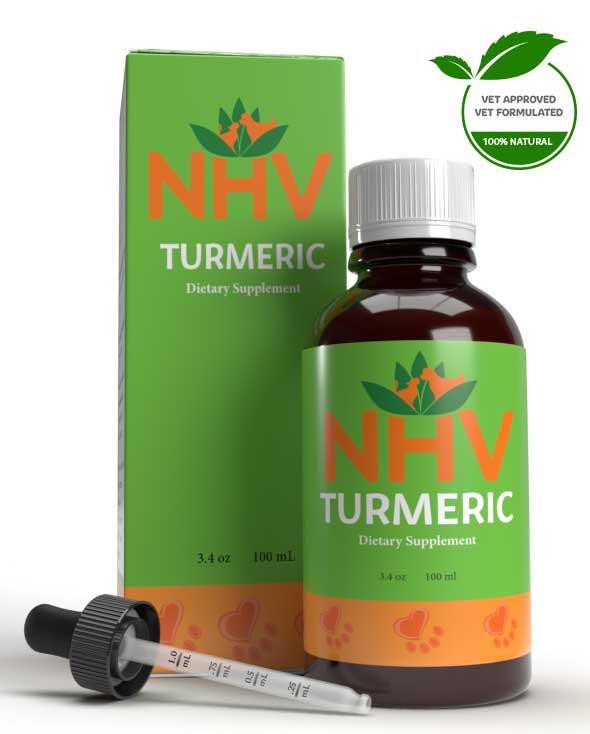
Support for Arthritis and Cancer
buy 2 and save $3
3 month supply for a small to medium size
From their tails to their whiskers, a cat’s body needs to be able to fight whatever comes their way - and not just the toys they like to chase, but health concerns too. NHV Turmeric for cats can be given to your furkiddos for a little extra TLC. This super herb offers support for a variety of conditions like cardiovascular issues, skin health, liver and kidney disease, arthritis, and overall well-being.
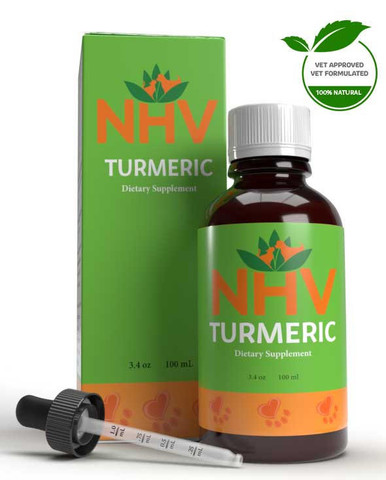
From their tails to their whiskers, a cat’s body needs to be able to fight whatever comes their way - and not just the toys they like to chase, but health concerns too. NHV Turmeric for cats can be given to your furkiddos for a little extra TLC. This super herb offers support for a variety of conditions like cardiovascular issues, skin health, liver and kidney disease, arthritis, and overall well-being.
Want to get your feline friend on a wellness-promoting supplement? Turmeric is an excellent choice - it’s well-tolerated by our whiskered furkiddos, and can offer them many benefits!
What goes into your cat’s body every day will make a difference when it is time to fight a disease, or when they already have one. That’s why NHV supplements are designed to be given each and every day for things like:
It can even be used proactively before your furry friend becomes sick in the first place by giving them a regular boost of natural goodness!
Turmeric itself is a root with vibrant orange-golden flesh. It’s golden in the world of herbalism for pets with its many healing properties.
One of turmeric’s most well-recognized healing properties is its antioxidant content. Antioxidants can help scavenge for free radicals, which are unstable molecules that cause damage to the cells. The free radical scavenging properties of turmeric can support the body in processing and removing these molecules, minimizing the damage they can do.
At NHV, we are experts at harnessing the benefits of herbal ingredients specifically for your pets. When you choose NHV Turmeric, you’re choosing decades of holistic pet wellness experience from vets and herbalists. Our formula is:
We are proud to have been a part of many cats’ success stories over the decades. Check out this feline friend of ours, Willow, who has used our Turmeric for cats formula for comfort and wellness.
Willow’s Story: “I have no doubt that the supplements from NHV have been a huge part in maintaining her health and staving off the cancer that was found in late 2021”
Holistic Veterinarian Approves of Using Turmeric for Cats
Dr. Hillary, a holistic vet, writes an in-depth overview of Turmeric and why she believes turmeric can play a beneficial role in pet health. Read Dr. Hillary’s Turmeric overview here.
All NHV supplements are made with the finest quality organic or ethically harvested herbs. We use non-GMO vegetable glycerin as our base. NHV products are full-spectrum extracts.
Select your pet's weight to determine the correct dose.
To be taken twice daily. Determine your pet’s weight and then use the easy chart below to determine the correct dose. This is the minimum dosage.
Pet's Weight Dosage
0 - 15 lb = 0.5 ml
16 - 30 lb = 1.0 ml
31 - 45 lb = 1.5 ml
46 - 60 lb = 2.0 ml
61 - 75 lb = 2.5 ml
Over 75 lb = 3.0 ml
How to Administer
Shake well before use. The easiest method is to use the dropper provide and places the drops into your pet’s food or favorite treat. You can also use the dropper and squirt directly into the pet’s mouth.
Some pets can be finicky, if this occurs consider hiding the drops in foods most pet’s love such as fish, chicken or yogurt or a favourite treat. If your pet only eats dry food then soak a few kibbles at feeding time.
For Best Results
Herbal dietary supplements are beneficial to the health and wellbeing of your pet and are safe for long-term use. Every pet responds to natural herbal supplements differently, therefore it is important to be consistent and administer the product daily. Supplements generally take two to four weeks to take effect, however this will vary from one animal to the next.
Product Storage
All NHV Natural Pet Products are pure herbal extracts and contain no artificial additives, preservatives or coloring. Shelf life after opening is 6 months and must be refrigerated after opening.
Cautions and Contraindications: Do not use Turmeric in pregnant or nursing animals. Speak to your vet before using our products. A second visit is recommended if your pet’s condition does not improve, or deteriorates after continued use of the supplements.
Want to get your feline friend on a wellness-promoting supplement? Turmeric is an excellent choice - it’s well-tolerated by our whiskered furkiddos, and can offer them many benefits!
What goes into your cat’s body every day will make a difference when it is time to fight a disease, or when they already have one. That’s why NHV supplements are designed to be given each and every day for things like:
It can even be used proactively before your furry friend becomes sick in the first place by giving them a regular boost of natural goodness!
Turmeric itself is a root with vibrant orange-golden flesh. It’s golden in the world of herbalism for pets with its many healing properties.
One of turmeric’s most well-recognized healing properties is its antioxidant content. Antioxidants can help scavenge for free radicals, which are unstable molecules that cause damage to the cells. The free radical scavenging properties of turmeric can support the body in processing and removing these molecules, minimizing the damage they can do.
At NHV, we are experts at harnessing the benefits of herbal ingredients specifically for your pets. When you choose NHV Turmeric, you’re choosing decades of holistic pet wellness experience from vets and herbalists. Our formula is:
We are proud to have been a part of many cats’ success stories over the decades. Check out this feline friend of ours, Willow, who has used our Turmeric for cats formula for comfort and wellness.
Willow’s Story: “I have no doubt that the supplements from NHV have been a huge part in maintaining her health and staving off the cancer that was found in late 2021”
Holistic Veterinarian Approves of Using Turmeric for Cats
Dr. Hillary, a holistic vet, writes an in-depth overview of Turmeric and why she believes turmeric can play a beneficial role in pet health. Read Dr. Hillary’s Turmeric overview here.
All NHV supplements are made with the finest quality organic or ethically harvested herbs. We use non-GMO vegetable glycerin as our base. NHV products are full-spectrum extracts.
Select your pet's weight to determine the correct dose.
To be taken twice daily. Determine your pet’s weight and then use the easy chart below to determine the correct dose. This is the minimum dosage.
Pet's Weight Dosage
0 - 15 lb = 0.5 ml
16 - 30 lb = 1.0 ml
31 - 45 lb = 1.5 ml
46 - 60 lb = 2.0 ml
61 - 75 lb = 2.5 ml
Over 75 lb = 3.0 ml
How to Administer
Shake well before use. The easiest method is to use the dropper provide and places the drops into your pet’s food or favorite treat. You can also use the dropper and squirt directly into the pet’s mouth.
Some pets can be finicky, if this occurs consider hiding the drops in foods most pet’s love such as fish, chicken or yogurt or a favourite treat. If your pet only eats dry food then soak a few kibbles at feeding time.
For Best Results
Herbal dietary supplements are beneficial to the health and wellbeing of your pet and are safe for long-term use. Every pet responds to natural herbal supplements differently, therefore it is important to be consistent and administer the product daily. Supplements generally take two to four weeks to take effect, however this will vary from one animal to the next.
Product Storage
All NHV Natural Pet Products are pure herbal extracts and contain no artificial additives, preservatives or coloring. Shelf life after opening is 6 months and must be refrigerated after opening.
Cautions and Contraindications: Do not use Turmeric in pregnant or nursing animals. Speak to your vet before using our products. A second visit is recommended if your pet’s condition does not improve, or deteriorates after continued use of the supplements.